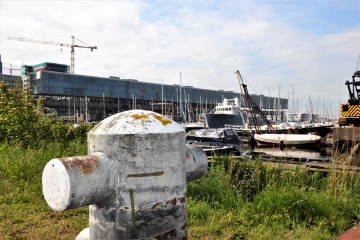
Arbitration is a way of resolving a dispute without going to court. In our commercial practice, we increasingly see parties considering including arbitration in commercial contracts, and with good reason. Experts (arbitrators) decide the dispute. Arbitration is an alternative to litigation, and the Netherlands Arbitration Institute (“NAI”) is one of the best-known arbitration institutes in the Netherlands. In arbitration at the NAI, experts from a particular sector decide on the dispute. They form the Arbitration Committee. The parties to the dispute can appoint their experts. This must be an odd number to avoid a tie. The decision of these experts is binding.
In the business world, in particular, parties often choose arbitration as an alternative to litigation. In this case, the parties agree in advance to submit any disputes to an arbitration committee. In this case, the parties choose arbitrators who work in the relevant industry. Arbitration can be quicker than going to court, and an arbitration award can have advantages over a court judgment, because in some (often non-European) countries a court judgment is not readily recognized by the Dutch courts.
The NAI’s amended Arbitration Rules, the NAI Arbitration Rules 2024, apply to arbitration commenced on or after 1 March 2024. The previous Arbitration Rules dated from 2015 and many changes have been made to make dispute resolution quicker and more efficient. In addition, the NAI Arbitration Rules 2024 provide additional safeguards in terms of quality, independence, and impartiality, as well as sustainability and inclusiveness. In this blog, our arbitration law firm in Amsterdam, highlights some of the most important changes.
NAI Arbitration Rules 2024
Additional safeguards for the independence and impartiality of arbitrators
Disclosure of funding
In order to ensure the independence and impartiality of arbitrators, a new disclosure requirement has been introduced in Article 8(2)(k) and Article 9(2)(f) regarding funding of the proceedings. The Claimant and the Respondent shall state in the Request for Arbitration or in the Answer to the Request for Arbitration, as the case may be, the name of any party, other than a party to the arbitration, who has entered into an arrangement with a party to the arbitration for the funding of (counter-) claims on the basis of which the latter party has a financial interest in the outcome of the arbitration. If such a funding arrangement comes into existence after the submission of the Statement of Claim or Statement of Defence, this information should be provided as soon as possible.
Arbitrator’s Statement and Challenge
Article 13(3) further expands the scope of the arbitrator’s statement. The prospective arbitrator who intends to accept the appointment as an arbitrator should confirm his independence and impartiality, availability and electronic accessibility in accordance with NAI Arbitration Rules 2024 prior to his appointment. In addition, the challenge procedure in Article 23 has been streamlined and the procedure is set out in Appendix B.
Efficiency improvements
Fast-track arbitration
In order to improve efficiency, the NAI Arbitration Rules 2024 introduce in Article 42 what is known as Expedited Arbitration, not to be confused with Summary Arbitration (Article 41). The express basis arbitration provided for in Article 42 and detailed in Appendix D shall apply where:
• the agreement(s) for arbitration by or with the NAI or under the Rules was/are entered into on or after 1 March 2024;
• the total amount claimed by the claimant in the request for arbitration does not exceed €1,000,000; and
• the parties have not excluded the application of the Emergency Arbitration Rules.
Determination
Whether or not emergency arbitration will ultimately be conducted depends on the outcome of the pre-trial hearing newly introduced in Article 26, which will take place no later than three weeks after the NAI Secretariat has made the arbitration file available to the arbitral tribunal. At the pre-trial hearing, the arbitral tribunal shall in any event address the following issues:
• the pecuniary value of the claim or each of the claims, including interest, and the pecuniary value of the non-pecuniary claims;
• whether, also given the nature of the case, the emergency arbitration should or can be followed;
• the use of electronic means, in particular the NAI Arbitration Platform, as well as the need for specific security measures when using electronic means;
• the desire or need to exchange further written submissions after the exchange of the Statement of Claim and Statement of Defense;
• preferences for a pre-trial hearing;
• the taking of evidence and the desire or need to produce documents;
• the desire or need for the taking of evidence through the examination of witnesses and/or experts;
• instructions or measures concerning the protection of personal data in accordance with Article 63.
No later than two weeks after the preliminary hearing, the Arbitral Tribunal shall, after hearing the parties, determine the order of proceedings, including a (provisional) timetable for the further conduct of the arbitration, including a provisional date for the award.
Early decision
In addition, to improve the efficiency of the proceedings and to avoid keeping the dispute unnecessarily “broad”, Article 45 allows a party to request the arbitral tribunal to decide at an early stage whether a particular (counter-)claim or defense is inadmissible, outside the jurisdiction of the arbitral tribunal or legally unfounded. The Tribunal shall decide on such a request within 30 days of being notified that the request for an expedited ruling is being considered.
Multiple agreements
Article 11 also provides for the possibility of dealing in a single arbitral tribunal with claims relating to disputes under more than one agreement, to the extent that such disputes between the same parties are subject to arbitration before the NAI or under the Rules.
Costs sanctions
Article 59(4) introduces the specific possibility for the arbitral tribunal to impose cost sanctions. The arbitral tribunal may now, when deciding on the apportionment of the costs of the arbitration and the costs of legal assistance, take into account how the proceedings were conducted and whether each party contributed to the expeditious and efficient conduct of the proceedings or, on the contrary, unreasonably delayed the proceedings, and adjust the award of costs accordingly.
Sustainability, Diversity and Inclusion
Finally, the NAI Arbitration Rules 2024 place a strong emphasis on sustainability, diversity and inclusiveness. This is reflected in Article 25(5), which states that all parties shall consider sustainability issues in the conduct of the proceedings. Articles 13(1) and 15(5) reflect aspects of diversity and inclusiveness. Sustainability is further promoted by requiring parties to communicate only electronically, via the NAI Arbitration Platform or by e-mail, as this would reduce the environmental impact of the arbitration.
Template clause arbitration (NAI)
The NAI provides a specific Dutch law arbitration provisions for its arbitration proceedings:
“All disputes arising in connection with the present agreement, or further agreements resulting therefrom, shall be settled in accordance with the Arbitration Rules of the Netherlands Arbitration Institute. The place of arbitration shall be Amsterdam. The proceedings shall be conducted in the English language. Consolidation of the arbitral proceedings with other arbitral proceedings, as provided for in Article 1046 of the Dutch Code of Civil Procedure is excluded.”
Our law firm in Amsterdam has a team of lawyers with a strong track record in arbitration. Would you like advice on commencing arbitration proceedings, arbitration clauses under Dutch law, setting aside or enforcing an arbitral award, or finding the best arbitration clause? Please contact Sander van Someren Gréve or Remko Roosjen or one of our other lawyers in Amsterdam at MAAK Advocaten.







